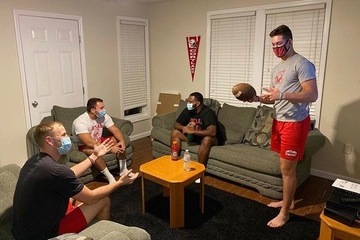
11/09/2020
Student-athletes at SUNY Cortland are finding ways to remain active in the community despite the postponement of fall athletics and the cancelation of winter competition.
The university’s Student-Athlete Advisory Committee (SAAC), a group comprised of 31 student-athlete leaders who best represent the interests of student-athletes at SUNY Cortland, have come together to promote mask wearing in the community to stop the spread of the novel coronavirus.
Erin Hallenbeck, a senior healthcare management major and field hockey forward from Hudson, N.Y., is president of SAAC. The committee, dedicated to promoting excellence in academics and athletics, sportsmanship, community service and a positive student-athlete image, ran the campaign over social media through September and October.
“The mask-up campaign is something fun we did on Instagram,” Hallenbeck said. “It allowed not just members of SAAC to participate, but other student-athletes as well as faculty and staff, to show that athletes are doing their best to do their part in stopping the spread of COVID-19.”
Over the summer, SAAC members voted on topics that were most important to the members of the Red Dragon community, to discuss for the 2020 to 2021 academic year. Topics included mental health, stress, anxiety and having tough conversations.

To that end, SAAC reached out to members of the Cortland community in the Counseling Center, Multicultural Life and Diversity Office and various academic departments to create the Athletic Leadership Speaker Series. With the help of contributions from Betsy Alden ’77 and Bonnie May ’77, student-athletes have been granted the opportunity to learn how to become better leaders and contributors.
Student-athletes will hold eight virtual meetings with faculty, staff and alumni to talk about ideas including social justice, nutrition, sleep and more.
“A lot of the topics that are talked about in the speaker series aren’t specific to athletics or academics,” Hallenbeck said. “It’s specific to life experiences.”
Mental health has been a prominent discussion among Cortland athletes for the past few years. This has allowed the men’s ice hockey team to form a partnership with the American Foundation for Suicide Prevention in the hopes to raise awareness for suicide and mental health.
“Our partnership with the foundation started last year when we were introduced to a woman named Jeanette Dippo, who is on the board for the Central New York chapter and had lost her daughter to suicide,” said Stephen Castriota, an assistant coach for men’s ice hockey. “We felt like this was a great opportunity for us as a program and school to get involved and raise awareness for a subject that most people don't feel comfortable enough to speak about.”
Unable to hold their charity game this year, men’s ice hockey planned to continue fundraising and participate in a virtual walk on Oct. 17. Unfortunately, the virtual walk was postponed due to the study-in-place order, but their fundraising campaign continues online.
“Without the ability to host a charity game this year, we thought it was important to continue the momentum of support that we gained last year and find a different way to raise awareness and money this year,” said Castriota. “We feel mental health and suicide are subjects that we must break the stigma and have real conversations about, so there is no fear or shame in reaching out when one needs to. Consistently bringing awareness to these subjects are important for the process of educating as many people as we can on the resources and support that is readily available for them at any given time.”
Men’s ice hockey plans to continue building the relationship with the American Foundation for Suicide Prevention by participating in Out of the Darkness Walks and hosting an annual charity game for years to come.
Individual athletes like Emma Schulz, a senior biology major from Poughquag, N.Y. and member of the gymnastics team, have also taken time to give back to the community. Schulz, the 2019 National Collegiate Gymnastics Association national champion in floor exercise, has volunteered to help work campus COVID testing.
“It’s important to remember your identity outside of being an athlete,” Schulz said. “With gymnastics not being a part of my everyday routine, I am finding other ways to stay involved with the campus community.”
When faced with adversity, Cortland student-athletes have stepped up and contributed to the community in different ways not possible in years past.
“We just want to help. We want to use our voices and our platform for good,” Hallenbeck said. “We want to do community service and we want to do more in the community, but COVID-19 has made that tough. We just want to use our platform for good and help people.”
Prepared by Communications Office writing intern Shannon Imbornoni